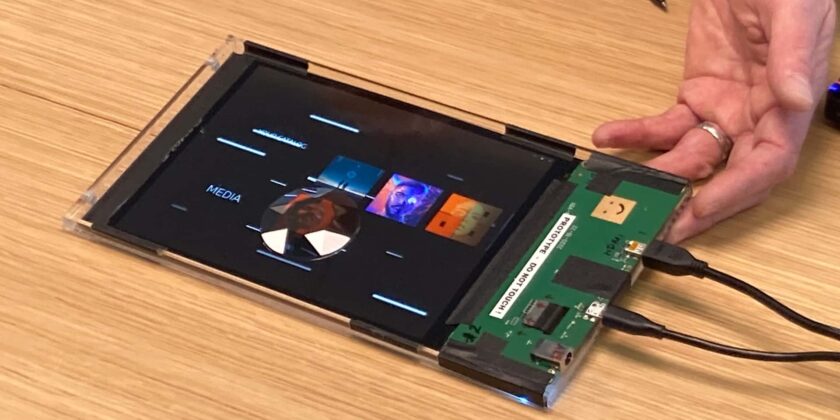Touchscreens have completely infiltrated cars in recent years, multiplying in number, growing in size and taking on more critical vehicle functions than ever before. The vast and capable interfaces in Tesla’s latest cars have even put the trusty gear selector out of a job. Drivers swipe up to switch into drive and down to reverse.
Whether you consider this digitization of the automobile forward progress or just want some darn buttons and knobs back, one thing about touchscreens has remained constant: they’re flat. BMW may soon change that.
The German carmaker is in the early stages of developing three-dimensional touchscreens that could alter the look and feel of its future cabins—if they ever make it to production. InsideEVs got to look at—but not touch—a prototype during a demonstration at BMW’s research and development office in Silicon Valley this week, and we can confirm that the initial concept looks cool and futuristic. We’ll have to wait until the tech is more fleshed out to see how it augments the user experience, if at all.
Full disclosure: BMW put me up in a nice hotel and fed me for a couple of days so I could see what its Technology Office in Mountain View, California is cooking up.
BMW showed off a small display with a raised, multifaceted bulge poking out from its center. It almost looked as if a golf ball-sized diamond was embedded partway into the screen. As vibrant graphics resembling what you’d see in a car’s infotainment system flashed across the screen, pixels danced across the 3D surface.
Gallery: BMW 3D Touchscreen Prototype In Action
If it were fully functional and in a car, the various facets could’ve been tapped to control things like the media player. This particular prototype wasn’t touch-sensitive, but BMW said it has operational ones that it’s keeping under wraps.
What’s the point? In part, it’s an attempt to recreate the benefits of traditional, tangible switches in an increasingly digital world, Etienne Iliffe-Moon, a designer and engineer at BMW’s R&D outpost, said. Giving drivers a physical touchpoint could help them adjust things more quickly and spend less time glancing at screens, improving vehicle safety, he said. Studies suggest that in-car screens lend themselves to distracted driving. Many people who have driven new cars, myself included, can attest that screens often demand more attention than simpler controls.
“The physical button that we used to have in the car 50 years ago—you know where that button is, it has a single function and it does what you need it to do,” Iliffe-Moon said. “This gives us that physical place you can find without really looking at it.”
Additionally, and unlike conventional buttons, BMW’s “jewel” could offer up different functions based on what the driver is doing, he said. He added that the interface could be customized for models across BMW Group’s various brands: BMW, Mini, Rolls-Royce, and BMW Motorrad (its motorcycle division).
Some readers may find it disappointing that BMW’s solution to touchscreens taking over cars may be yet another touchscreen. Still, the idea is outside-the-box and eye-catching, much like the mesmerizing orb in Genesis’ new electric SUV. And a unique kind of touchscreen controller you can’t get in any other car could certainly dazzle future BMW customers.
BMW wouldn’t say if or when the 3D display will leave the lab and enter an actual production vehicle. We’ll be keeping an eye out for the jewel—or something like it—in BMW’s next-generation vehicles arriving in 2025. BMW has teased that those vehicles will be brimming with flashy technology, including potentially a projected display that spans the entire width of a car’s windshield.
Source: Read Full Article

